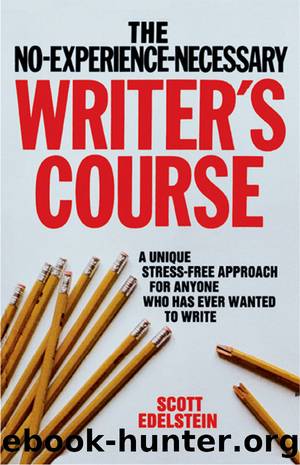No Experience Necessary Writer's Course by Scott Edelstein

Author:Scott Edelstein
Language: eng
Format: epub
Publisher: Scarborough House
Published: 1990-01-15T00:00:00+00:00
57
Finding Your Ideal Critic
SOONER OR LATER youâre going to want others to read at least some of what youâve written. Youâll probably also want some good criticism on your finished and/or unfinished work. How and where do you find a good critic, and what makes someone a good one?
First of all, someone who may be a good critic for one author (or one particular piece) may not be for another. A lot depends on what that piece or author is trying to achieve. Nor does someone have to be a reviewer, writing teacher, editor, English major, or another writer to be a decent critic. Indeed, a good critic need not have a background in literature at all, as long as he or she is intelligent. (It is also possible that someone who does have the âproperâ background will be an inappropriate or worthless critic for a particular piece or author.)
The most important qualification of a critic for your work (or for one particular piece you have written) is that he or she be generally sympathetic to what you are trying to do. If you write a sonnet sequence and bring it to someone who hates rhymed poetry, you are not going to get a useful critique, even if that person has won a Nobel Prize in literature; he or she will probably critique your choice of form rather than your work itself.
If youâve written a science fiction story, your ideal critic will need to like science fiction. If youâve written an experimental prose poem lauding cats, your ideal critic will be someone who likes cats and who isnât afraid of nontraditional forms and approaches.
No piece of writing is going to appeal to everybody; any time you write any poem or story you are automatically selecting a limited audience to appeal to. Your ideal critic should represent the sort of reader you are trying to reach in that particular piece.
Where do you find such a person? You can of course contact a paid manuscript critic if you like; ads for many of these critics appear in the back of the magazines Writerâs Digest and Writerâs Yearbook. If you are enrolled in a writing class, you can approach your instructor and/or one of your fellow students; if you like, you can enroll in such a class just for this purpose. You also have the option of arranging an independent study project with an instructor in which he or she critiques your work.
Another possibility is joining or signing up for an existing writersâ workshop, or starting a workshop of your own. (See chapter 96 for details.)
But it is often enough to simply find a friend or relative who thinks more or less like you do and whose opinion you respect. Almost any intelligent person who exemplifies the kind of reader you are trying to reach will do.
Here are the other qualifications of a potential critic:
⢠He or she must be willing to read your work carefully and offer honest reactions.
⢠He or she must be at least moderately literate and articulate.
Download
This site does not store any files on its server. We only index and link to content provided by other sites. Please contact the content providers to delete copyright contents if any and email us, we'll remove relevant links or contents immediately.
| Authorship | Bibliographies & Indexes |
| Book Industry |
Autoboyography by Christina Lauren(4699)
Asking the Right Questions: A Guide to Critical Thinking by M. Neil Browne & Stuart M. Keeley(4634)
Dialogue by Robert McKee(3619)
Eat That Frog! by Brian Tracy(3559)
Sticky Fingers by Joe Hagan(3473)
Journeys Out of the Body by Robert Monroe(3024)
Elements of Style 2017 by Richard De A'Morelli(2960)
Annapurna by Maurice Herzog(2869)
Schaum's Quick Guide to Writing Great Short Stories by Margaret Lucke(2826)
Full Circle by Michael Palin(2802)
The Diviners by Libba Bray(2466)
The Art of Dramatic Writing: Its Basis in the Creative Interpretation of Human Motives by Egri Lajos(2436)
The Mental Game of Writing: How to Overcome Obstacles, Stay Creative and Productive, and Free Your Mind for Success by James Scott Bell(2411)
Why I Write by George Orwell(2385)
Atlas Obscura by Joshua Foer(2366)
In Patagonia by Bruce Chatwin(2294)
The Fight by Norman Mailer(2176)
The Elements of Style by William Strunk and E. B. White(2087)
Venice by Jan Morris(2069)
